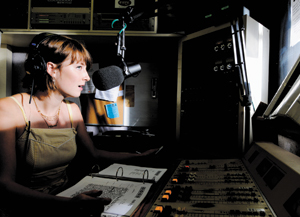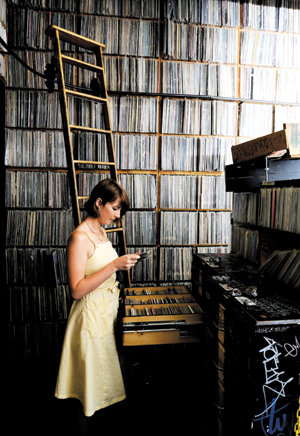Radio days—and nights
By Rose Schapiro, ’09
Photography by Dan Dry
“You’re listening to WHPK, 88.5 FM, the pride of the South Side. It’s 9:53 in the studio, so I hope that means it’s 9:53 out there as well,” quips Moira Cassidy, ’11, a rock deejay and station manager of WHPK, the nonprofit community radio station that broadcasts from the Reynolds Club’s Mitchell Tower. “Sometimes I get worried that there’s this radio time warp.” In fact, it is 9:53 a.m. out in what Cassidy characterizes as “the real world,” and she still has two more hours of her radio show to get through. She cues the next song, experimental-pop band Deerhoof’s “Kidz are So Small,” and goes to pull other albums from the station’s library.
Reachable by a narrow flight of stairs marked “WHPK only,” the studio can feel isolated from the world to which it broadcasts—it’s a place where time gets measured not in minutes but in song lengths and public-service announcements.
 Second-year Moira Cassidy broadcasts her WHPK show, National Public Rumpus, every Tuesday.
Second-year Moira Cassidy broadcasts her WHPK show, National Public Rumpus, every Tuesday. Since 1946 radio has broadcast from campus. WHPK’s predecessor, WUCB, moved to the Reynolds Club from Burton-Judson in 1959. Nine years later, WHPK was formed, and it took over the studio in March 1968 as a ten-watt station (in 1985 it upgraded to 100 watts). Since then deejays have broadcast from the tiny studio and cultivated the library—dozens of shelves with vinyl albums and singles spanning floor to ceiling alongside mammoth cabinets of compact discs. The library houses everything from Tchaikovsky symphonies to jangly twee pop, which one deejay describes as “cuter than both the boys and the squirrels.” The collection has shaped the music tastes of generations of College deejays such as Cassidy, who tends to play melodic indie-pop.
Musical eccentricity was one factor that alt-weekly Chicago Reader cited this past June, when it named WHPK the city’s best college radio station. The Reader joked that the station exemplifies the diverse, do-it-yourself aspect of radio, as it “broadcasts from the University of Chicago on 100 watts of sheer willpower.” While the station’s signal usually peters out around Pilsen, five miles north of campus, WHPK does stream to the entire world on its Web site.
In use 24 hours a day, the studio and library appear predictably lived-in. The rock format, which runs from midnight until noon Sundays through Fridays, consists mostly of undergraduates giving up their sleep—first-time deejays are assigned shows between 4 and 6 a.m. But the station also has a public-affairs format, where students and community members analyze issues ranging from neighborhood concerns about affordable housing in Woodlawn to international political issues.
 As other deejays do for their shows, she peruses the station’s record library to find selections that match her indie-pop tastes.
As other deejays do for their shows, she peruses the station’s record library to find selections that match her indie-pop tastes. Katie Buitrago, ’09, the station’s publicity director, says she never considered doing radio before she came to the College. But during orientation a WHPK staffer encouraged her to submit a playlist. “I used to have more narrow tastes,” she says. “I was really into punk rock.” Since joining WHPK her palate has expanded to include “garage, psych, freak-folk, stoner metal,” and she’s learned to appreciate music more for being “well done, whatever the genre.”
Buitrago, who’s been a deejay for three years, notes that the activity helped her “feel less lonely” when she started school and that most of her College friends have been involved with radio. Cassidy, who followed the Denver concert scene and made carefully chosen mix tapes for her family and friends in high school, calls WHPK a “home away from home.”
After deejaying for only two quarters, Cassidy took on the station-manager position to learn more about behind-the-broadcast work, though the job also means being on-call day and night for problems such as a spastic transmitter or a missing-in-action deejay. Buitrago, a public-policy and Latin American–studies major, has held several positions, from traffic director (“I got the mail and office supplies—very glamorous”) to program director (second-in-command after the station manager).
WHPK is unique, Buitrago says, because “it’s staffed by a real person 24/7. A lot of stations either don’t run 24/7 or use automation at night.” WHPK has 160 deejays, about 90 of whom are U of C undergraduates; the rest are graduate students or community members. The station’s “standing in the community outside of campus,” Buitrago notes, also makes it special among college-run stations, with deejays producing shows for decades, like Arkansas Red’s The Blues Excursion. Some undergraduates stick around after graduation to do a show or otherwise help out, providing WHPK, Cassidy says, an institutional memory often absent at college stations that rely only on a transient student staff.
Cassidy first visited the record library as a prospective student, and she says WHPK is “probably the reason I came to this school.” Her show, National Public Rumpus, runs from 9 a.m. until noon every Tuesday this summer, an hour longer than during the academic year. To fill the time, she’s organized her playlist alphabetically. Today she plays songs staring with the letters J, K, and L. Though she enjoys the slower pace of summer, Cassidy looks forward to the fall—the O-week concert that the station uses to introduce itself to first-years, and of course finding new deejays willing to give up some sleep in pursuit of sharing the perfect song.
Return to top